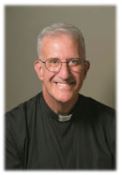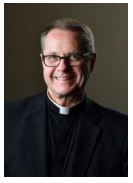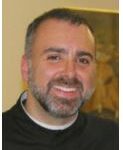September 28, 2025 – Twenty-Sixth Sunday in Ordinary Time

Dear Sisters & Brothers,
Conscience calls on a person to be authentic, especially to his or her deepest instincts for the good. In one’s conscience, we find interior motivation, not someone or something telling us what to do. Our conscience should not only motivate us to be good but also prompt us to do good.
Pope St. John XXIII wrote in his encyclical Pacem in Terris, “The Creator of the World has imprinted in man’s [sic] heart an order which his conscience reveals to him and enjoins him to obey.” Conscience has a biblical foundation. Though the term does not appear in Jewish scriptures, the writings do say a lot about the heart. The heart in Jewish understanding is the core of the human being, in which each person is most uniquely oneself and face-to-face with God. The gospels continue this understanding where the Semitic term “heart” is synonymous with conscience.
Our first reading this weekend from the prophet Amos, and the gospel reading from chapter 16 of Luke, call on us to open our eyes to the plight of the neediest among us, and to form our consciences in a way that will not allow us to ignore their needs. Amos and Luke were addressing the affluent communities. Amos, speaking on behalf of God, criticizes those who have more than they need to live comfortably and who ignore the needs of the poor. In the story of the rich man and Lazarus, Jesus makes a point of saying that the rich man had to step over Lazarus to get in and out of his house, yet he did nothing to alleviate the man’s suffering.
None of us can alleviate the sufferings of the poorest among us on our own. That does not excuse us, however, from doing something. Jesus does not give us the option of judging whether a person is worthy of our help or not. Judgment belongs to God. We who follow Jesus are called to open our eyes and our hearts, and to share the blessings God has given us with those who cannot provide for themselves.
I will close with a quote from Thomas Merton:
“It is easy enough to tell the poor to accept their poverty as God’s will when you yourself have warm clothes and plenty of food and medical care and a roof over your head and no worry about the rent. But if you want them to believe you, try to share some of their poverty, and see if you can accept it as God’s will yourself.” (Thomas Merton, Seeds of Contemplation, Chapter 4, page 107).
With my love,Fr. Brian
September 21, 20205 – Twenty-Fifth Sunday in Ordinary Time
Congratulations Father Tim!!
Father Tim Kitzke has been selected to receive The Alumnus Lifetime Service Award from the Theological College at The Catholic University of America. He will be presented with the award on October 8, 2025 in Washington, DC at the college’s Alumni Day Mass and Award Dinner.
The Alumnus Lifetime Service Award was instituted almost 35 years ago to honor those alumni of Theological College who have served with distinction and humility throughout their priestly ministry according to the Sulpician ideal “to live supremely for God in Christ Jesus” (Father Jean Jacques Olier, Founder of the Society of St. Sulpice). Award recipients have included Bishops Michael Olson and Robert Barron, Archbishop Mitchell Rozanski, Cardinal Daniel Dinardo, and internationally recognized philosophers Monsignor John Wippel and Monsignor Robert Sokolowski.
Father Tim is being recognized for a lifetime of outstanding priestly service as a Church leader, mentor, and champion of the poor and vulnerable.
While still in undergrad years, Father Tim was accepted into the Basselin Scholars Program, an exclusive three-year honors program in philosophy consisting of the junior and senior years of undergraduate study and one year of graduate work, leading to the Ph.B. and Ph.L. degrees, respectively. It is for seminarians who have a vocation to the priesthood, and the ability to keep up with the high-level academic demands, the formation requirements of seminary life, and the pastoral ministry responsibilities of students in formation at that level.

September 14, 20205 – Feast of the Exaltation of the Holy Cross
In 1937, on the eve of the Second World War, Pope Pius XI wrote to the people of Germany: “The Cross of Christ, though it has become to many a stumbling block and foolishness, remains for the believer the holy sign of his redemption, the emblem of moral strength and greatness. We live in its shadow and die in its embrace. It will stand on our grave as a pledge of our faith and hope in the eternal light” (Mit Brennender Sorge, 26).
As we celebrate the Feast of the Exaltation of the Holy Cross this Sunday, it’s important for us to remember that the Cross, for us Christians, is more than an expendable instrument of torture and death: it is the sign of salvation and victory. This is why the Preface of the Mass for today’s feast reminds us the Father “placed the salvation of the human race on the wood of the Cross, so that, where death arose, life might again spring forth and the evil one, who conquered on a tree, might likewise on a tree be conquered, through Christ our Lord.”
The themes, images, and language used by the Church on this Feast of the Exaltation of the Holy Cross, remind us of the somber tones of Good Friday. But in the light of Easter faith, we recognize that Jesus is the Father’s gift of perfect love to humanity, and so, we are called to believe ever more deeply in the One who has been lifted up, “so that everyone who believes in Him may have eternal life”. (John 3:15).
In the Divine Savior,
Fr. Silas, SDS

September 7, 20205 – Twenty-Third Sunday in Ordinary Time
What confession is and isn’t
One of my fondest memories as a cradle Catholic is going to confession for the first time. I remember vividly the gut-wrenching feeling as I waited in line imagining all sorts of possible scenarios. It didn’t help that prior to waiting in line my friends told me to avoid a certain priest because rumor had it that he smacked penitents in the head with his bible. Ironically, when it was my turn, my catechist instructed me to go to the confessional where this priest was. As I knelt in front of him, I felt as if I was standing in a tribunal, waiting to receive a death sentence. Tears ran down my 7-year-old cheeks and I was so scared I forgot what to say. Gently, the priest led me into prayer and assisted me with my confession as he asked questions. I simply responded “yes” or “no”. Suddenly, he assigned me an easy penance and gave me absolution. At last, he uttered the most freeing words I have ever heard, “Go in peace and sin no more. Your sins are forgiven”.
I share this anecdote because it highlights my misconception of the sacrament. Truth is, the Sacrament of Reconciliation is often poorly explained and thus, poorly understood. For instance, Reconciliation is not the courthouse, where one can go to plea his/her innocence. There is no need to justify or over explain why we committed a sin. Reconciliation is also not pseudo-counseling, where one asks the priest for advice. Reconciliation is not something we do only when we have “big sins”. The list goes on, but what is most important is that we understand what the sacrament really is.
Above all, Reconciliation is God’s gift to us. That said, the priest, even if he wanted, cannot deny absolution, unless there is lack of contrition or repentance. Christ instituted this powerful sacrament (Jn 20:21-23) to pardon the sins we commit after our baptism. That said, reconciliation is an act, the act of asking God’s pardon. As such, there is no need to explain why we sinned, simply name the sin by kind and number- to the best that you remember. Questions can be asked if they pertain to a certain moral act, such as, to figure out whether an act is a sin or not, and of what nature (i.e. mortal or venial).
As we come before the throne of mercy, let us also remember that we are all sinners. As a priest, I am there to extend God’s mercy through the sacrament, not to smack penitents with a bible. Your priests desire to extend this wonderful gift, don’t pass up the opportunity to receive it.
Yours in Christ,
Fr. Ariel
[Jesus] said to them again, “Peace be with you. As the Father has sent me, so I send you.” And when he had said this, he breathed on them and said to them, “Receive the holy Spirit. Whose sins you forgive are forgiven them, and whose sins you retain are retained.” Jn 20:21-23



